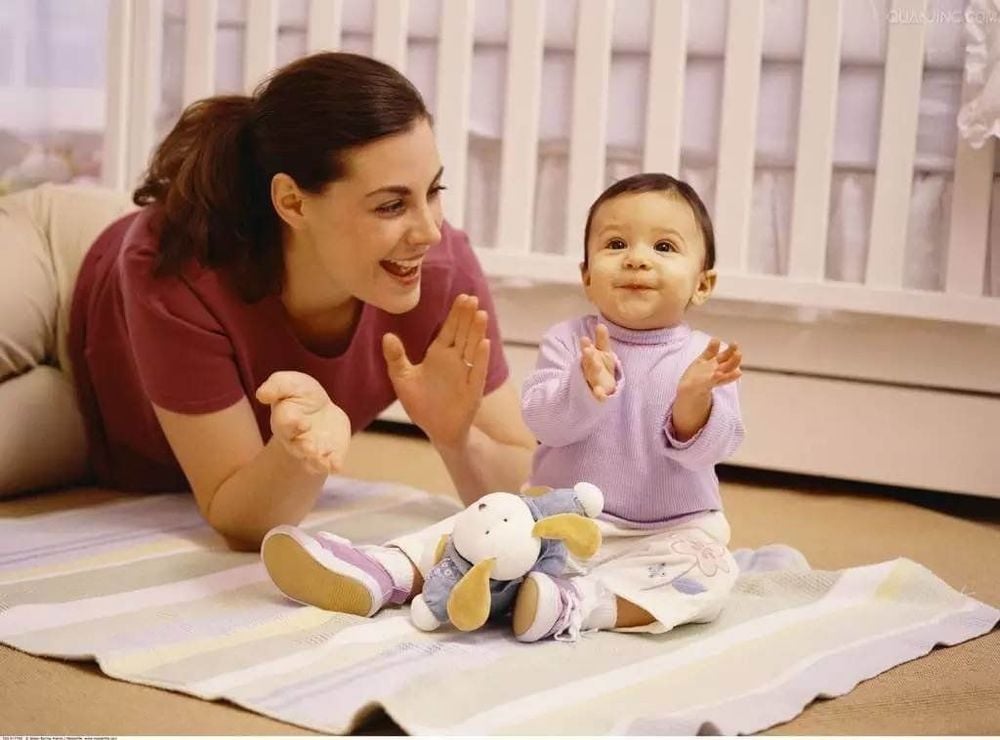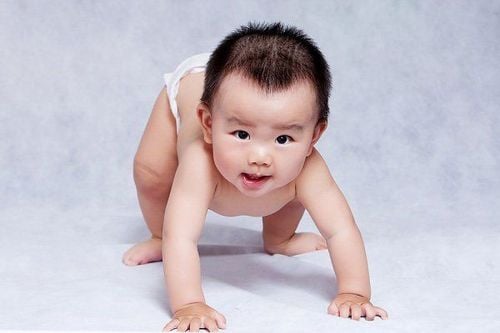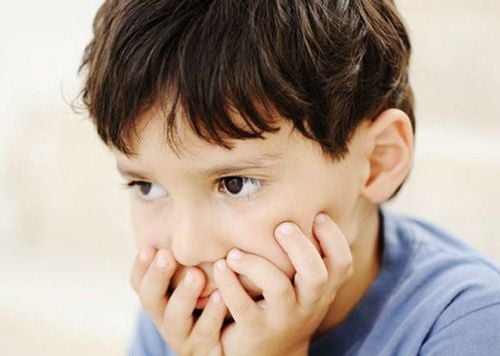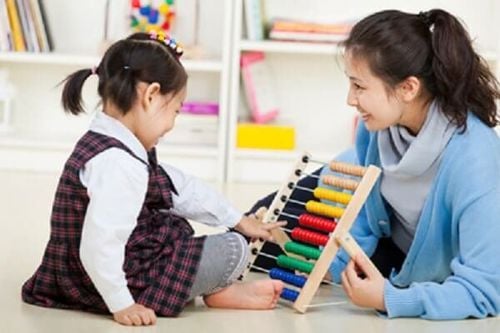This is an automatically translated article.
The article was professionally consulted by resident Doctor Duong Van Sy - Department of Pediatrics - Neonatology - Vinmec Hai Phong International General Hospital. Doctor has 09 years of experience in the field of Pediatrics.Children aged 1-2 years are better able to understand what we tell them and express what they want through words and gestures. By listening to other people speak, your child will learn how to pronounce a word and how to put words together to make a sentence. As with other skills and milestones, the age at which children learn language and start speaking can vary.
1. What is the difference between speech and language?
First we need to distinguish the difference between language and speech:Speech : is the verbal expression of language and includes pronunciation. In other words, this is how we form sounds to communicate and express our thoughts. Language: is what is used to give and receive information. It is understanding and is expressed through verbal or non-verbal (gestures, actions) and written communication.

Trẻ em từ 1 - 2 tuổi có khả năng hiểu tốt hơn những gì chúng ta nói với chúng và thể hiện những gì chúng muốn thông qua lời nói và cử chỉ
2. When can children talk?
Speaking and understanding speech go hand in hand. By listening to others, your child will learn how words sound and how to put words together to make a sentence.As a baby, children first discover how to make sounds, then how to turn those sounds into really meaningful words like “dad”, “grandma”, “mama”, “mama”. mam",...
At 1 year old, children are trying to imitate the sounds around them. Although you can hear your baby babbling in a language only he can understand.
This is an extraordinary stage of development, as your toddler goes from saying a few simple words to asking questions, giving instructions and even telling you related stories.
Here's a general timeline of how you can expect your toddler's speaking skills to progress. Remember that every child develops differently. Children acquire language in stages, and they may reach those stages at different times.
If your child is a little different from these general timelines, don't worry. If your child was raised in a bilingual environment, the number of words he or she can say may be split between the two languages he is learning.
2.1. From 12 to 18 months old, how do children learn to speak? By their first birthday, your child will probably start using a word or two that make sense. Over the next few months, your baby will try to copy words, and you can hear him babble as if he were having a real conversation. Children will even practice the sound of their voice, raising their voice when asking questions.
Children are learning to talk as a means of communicating their needs. Until children learn more words to express their ideas and desires, they may combine their words with gestures to express what they want. For example, your baby will reach out his hand towards his favorite toy and say "ball"....

Vào ngày sinh nhật đầu tiên, trẻ có thể sẽ bắt đầu sử dụng một hoặc hai từ có nghĩa
Don't worry if your child struggles to achieve his or her meaning now and then. This frustration is actually a healthy sign that your child is trying to communicate and cares about your understanding.
By 18 months, your baby will probably start making many common consonants, such as “t”, “d”, “n” and “h”. By learning to make these sounds as an early event, children will progress to the rapid vocabulary growth most children experience during this period.
Don't expect to hear all of these sounds in actual words. But you may hear them repeat them when alone in the crib or playing with their toys.
2.2. From 19 to 24 months old, what can babies say? Between the ages of 19 and 24 months, babies understand simple commands and questions. With each passing month, children will add more words to their vocabulary. Many of these words will be nouns for objects in your child's everyday life, such as "spoon" and "car",...
During this stage, your child may begin to match two or three words together, forming basic sentences like "Carry the baby". Since a child's grammar skills are still underdeveloped, you'll hear strange structures like "I'm going".
Sometimes children understand that they need language and will try to name new objects as they observe the world around them. However, children may overpronounce words they already know, for example, all new animals are called "dogs".
Starting at their second birthday, children will begin to use simple sentences of two to four words and sing simple tunes. As their sense of self matures, they'll use "you" to refer to themselves and they'll likely let you know what they like and don't like, what they think, and what they feel.
You can also hear your baby say, for example, "I want milk" or "Baby pours milk". With children, pronouns are difficult to use, so you may notice that your child avoids them.
2.3. From 25 to 30 months old, what can babies say? As children have more vocabulary, they will begin to experiment with sound levels. For a while, your baby may scream when she wants to speak, then speak normally and whisper softly when answering questions, but she'll soon find the right volume.

Khi đã có vốn từ vựng nhiều hơn, trẻ sẽ bắt đầu thử nghiệm các mức độ âm thanh
Children will even enjoy talking about events that happened in the past. However, children may not fully understand the past tense or plural specifically, so you will hear them say things like "I am running" or "I am swimming". Sure, that's cute, but it also shows that the child is grasping the basic rules of grammar.
At this age, children will begin to answer simple questions, such as "Do you want a snack?" and "Where are your shoes?". If you notice that your child is not using two-word phrases, repeatedly repeating your familiar expressions, or not responding to his or her name, ask your doctor. Such behavior can be an early sign of a developmental delay.
2.4. From 31 to 36 months old, what can babies say? By the age of 3, your child will become a more refined talker. Children will be able to carry on long conversations and adjust their tone, speech, and vocabulary to match the person they are talking to.
For example, children will often use simpler words with a peer "I need to go to the bathroom"; but your baby will use more complex structures when talking to you like “Mom, I need to go to the bathroom.” They will also understand simple grammar rules and use plurals and pronouns correctly.
Now other adults, including strangers, can understand almost everything your child says, which means you won't have to interpret as much anymore Your child will even be a pro at speaking them , his name and age and will be ready to answer when asked.
3. What can you do to help your child learn to speak?
You can help your child develop language skills by providing a rich communication environment. The most important things you need to do are:Talk: research shows that parents talking to their child plays an important role in their child's language development. You don't have to chat non-stop, but talk to your child whenever you're around him. Describe what you are doing, point out things, ask questions, sing songs. Your child will learn to speak well by listening to you speak well. Reading: Reading to children is a great way to expose children to new vocabulary, how sentences are put together, and how stories are told fluently. But don't just read the words, you can combine it with asking your child to find things in the illustrations or tell you what happened to the characters they know. Listen: when your child talks to you, be a good listener by looking at your child and responding. Children are more likely to speak up when they know you care about what they are saying.

Bạn có thể giúp trẻ phát triển kỹ năng ngôn ngữ bằng cách cung cấp một môi trường giao tiếp phong phú
4. Children with speech delay, when to care?
You are the best person to assess your child's speech development. If your child has any of the signs listed below and you are concerned, you should discuss with your doctor the possibility of a language delay or hearing problem. If deemed necessary, the doctor will refer the child to a speech-language pathologist - paediatrician for evaluation.When noticing that children have any signs that they are slow to speak, parents should first not worry too much, but take the child to a pediatric specialist medical facility for a doctor to check. Depending on the degree of speech delay and the age of the child, the doctor will have appropriate interventions to improve the delay in speech in children.
To help children develop the best physical and verbal language, in addition to nutrition, parents should supplement their children with supportive products containing lysine, essential micro-minerals and vitamins such as zinc, chromium, selenium, vitamin B group helps to fully meet the nutritional needs of children. At the same time, these essential vitamins also support digestion, enhance nutrient absorption, increase resistance, and help children develop comprehensively.
Please regularly visit Vinmec.com website and update useful information to take care of your baby and family.














